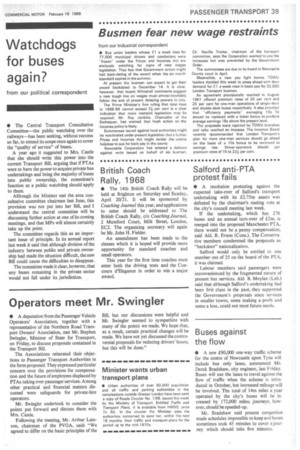Busmen fear new wage restraints
Page 41

If you've noticed an error in this article please click here to report it so we can fix it.
from our industrial correspondent
• Bus union leaders whose £1 a week rises for 77,000 municipal drivers and conductors were "frozen" under the Prices and Incomes Act are anxiously watching for signs of new wages legislation. They fear that Government action might halt back-dating of the award when the six-month standstill expires in the summer.
At present the busmen can expect to get their award backdated to December 14. It is clear, however, that recent Whitehall comments suggest a new tough line on wages must almost inevitably follow the end of present delaying powers in July.
The Prime Minister's firm ruling that total rises in 1968-69 cannot exceed 31 per cent is a clear indication that more restraint legislation may be required; Mr. Roy Jenkins, Chancellor of the Exchequer. has warned that fresh action on the incomes policy is likely.
Summonses issued against local authorities might be reactivated under present legislation; but a further Prices and Incomes Act might render the unions helpless to sue for back pay in the courts.
Newcastle Corporation has entered a defence against writs issued on behalf of six busmen Clr. Neville Trotter, chairman of the transport committee, says the Corporation wanted to pay the increases but was prevented by the Government Order.
The summonses are due to be heard in Newcastle County court in April.
Meanwhile, a new pay fight looms. TGWU leaders decided this week to press ahead with their demand for £1 a week rises in basic pay for 33.000 London Transport busmen.
An agreement provisionally reached in August 1967 offered premium rates of 20 per cent and 25 per cent for one-man operations of single-deck and double-deck buses respectively. It also provided that "efficiency payments" averaging 19s 7d should be replaced with a ticket bonus to produce average earnings 18s above the present level.
The proposals were rejected by TGWU branches and talks reached an impasse. The Incomes Board recently recommended that London Transport's plan for more one-man services should go ahead on the basis of a 10s bonus to be reviewed as savings rise. Driver-operators should get premium rates of 15 to 221 per cent.




















































































































